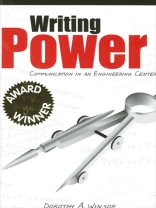Winner of the 2004 Distinguished Publication on Business Communication presented by the Association of Business Communication
Writing Power examines the way that texts, knowledge, and hierarchy generate and support one another within a for-profit corporation. By encouraging us to see texts and writing as powerful operators in the corporate world, this book presents a case study focused on how one engineering organization uses texts to create and maintain its knowledge and power structure. Based on over five years of observations, the book describes the co-generation of power/knowledge/text from several points of view, including that of managers, engineers, interns, and blue-collar workers. These groups of people use texts to build knowledge within their own areas and establish control over their work when it is passed along to the other groups. Employing Bourdieu’s notion that people possess different kinds of ‘capital’ that can be converted to one another under the right circumstances, the book demonstrates that text is one of the major ways that this conversion of capital takes place, and is thus one of the major ways that power and knowledge are generated and accumulated.
Mục lục
Illustrations
Acknowledgments
Vignette 1. Scenes in an Engineering Center (and Elsewhere)
Chapter 1. Using Writing to Negotiate Knowledge and Power
Vignette 2. Two Hours in an Afternoon of a Manager: Doug
Chapter 2. Managing the Organization through Powerful Texts
Vignette 3. A Meeting with Engineers: John
Chapter 3. Negotiating Knowledge Across, Down, and Up the Hierarchy
Vignette 4. Two Hours in a Technician’s Afternoon: Rich
Chapter 4. Amassing Knowledge in the Hands of the More Powerful
Vignette 5. An Engineering Intern’s Morning: Kevin
Chapter 5. Entering Systems of Knowledge/Power
Chapter 6. Knowledge/Power/Texts in an Engineering Center
Notes
Bibliography
Index
Giới thiệu về tác giả
Dorothy A. Winsor is Professor of English at Iowa State University. She is the author of
Writing Like an Engineer: A Rhetorical Education.












